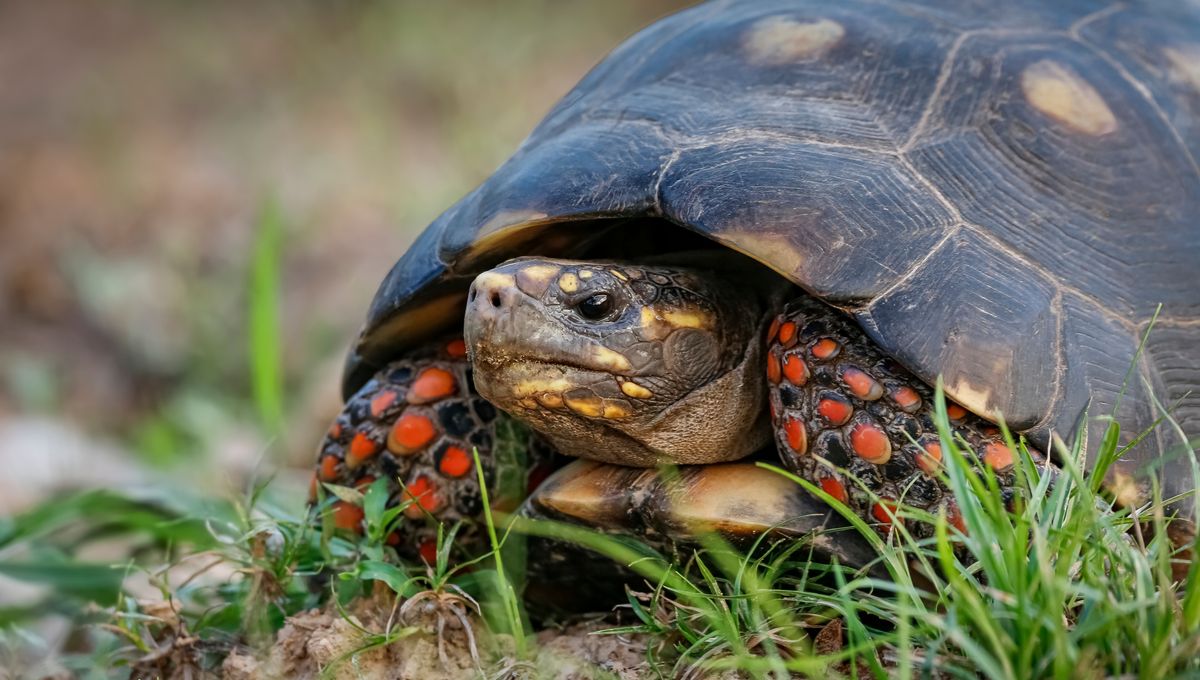
Red-footed tortoises have moods, at least of optimism and pessimism, just as so-called higher animals do, a new study has concluded. The work has important implications for how we regard and treat reptiles, and how deep such capacities run in our evolution.
Philosophers spent thousands of years arguing about whether animals think, so it’s not really surprising that some are skeptical about non-humans having feelings. Nevertheless, it is now generally accepted that birds and mammals can get their noses, or beaks, out of joint. There’s far less support for extending the idea to invertebrates, cephalopods aside, but reptiles are more contested ground.
Since it is hard to ask reptiles how they’re feeling, University of Lincoln researchers gave 15 red-footed tortoises (Chelonoidis carbonaria) a cognitive bias test, which is used in humans and other mammals to differentiate optimistic or pessimistic outlooks. Further testing explored the shelled ones’ anxiety.
Specifically, the authors marked out five locations for food bowls in an arc inside a nearly square enclosure, but with a bowl at only one of these at any time. The tortoises were trained that a bowl at one location would soon be filled with food, but at another site it would remain empty. Other animals might not care about this, but for a tortoise, the unrewarded plod to a bowl is a waste of time and energy they don’t want to spare.
Bowls were subsequently placed either at the familiar sites or at ambiguous locations. The tortoises were filmed deciding whether to make the journey. At least the budget didn’t have to stretch to high-speed cameras.
In a second trial, the tortoises were returned to the same enclosure, but instead of a food bowl, they encountered a novel object, and were watched to see if they checked this strange thing out or stayed away. The body language of those that did approach was also recorded, which for a tortoise means how far they stuck their heads out of their shells. One tortoise was excluded from the trial for taking a crap instead of investigating, which may or may not have indicated what it thought of the whole exercise.
Finally, the enclosures were redecorated with new colors and textures, and the tortoises returned. Again, their reactions were observed to determine anxiety.
This, the authors claim, is the first time a cognitive bias test has been conducted on any reptile species and reported in scientific literature.
Some tortoises apparently had a positive outlook on life, hastening (relatively speaking) to ambiguously placed bowls, while others feared the universe was out to get them. The researchers found optimistic tortoises also scored lower on the anxiety test. This, they argue, indicates a positive or negative mood. The team define moods as: “Longer-term ‘free-floating’ states unattached to a specific object or event, reflecting background subjective experience.”
“This is an exciting finding that represents a significant shift in our understanding of what reptiles can experience, with important implications for how we care for these animals in captivity and interact with them in the wild,” said Professor Oliver Burman in a statement.
Reptiles don’t tend to be very highly regarded by our society. The very word is a term of abuse, marking someone as cold and unfeeling, although tortoises get a bit of a pass. We talk about our “lizard brains” when acting without planning or nuance.
Yet such terms may be almost as inaccurate as references to “bird-brains” have been shown to be by corvids and parrots. Reptiles’ problem-solving capacity has been demonstrated for four decades. The researchers think this work shows they have long-term mood states as well.
If tortoises can get down in the dumps, it’s likely the conditions in which they are kept could make them so, which creates a moral imperative to keep captive ones happy.
“Animal welfare concerns are reliant upon evidence that a given species has the capacity to experience affective states. With reptiles becoming increasingly common as pets, it is essential for us to study their moods and emotions to try to understand how captivity may impact them,” said Professor Anna Wilkinson.
From an evolutionary perspective, this either means that the last common ancestor of reptiles, birds, and mammals had feelings, or tortoises, and perhaps some other reptiles, developed them independently of us. The former case would mean that feelings have probably been a feature of all the other branches of the reptile family tree, dinosaurs included. On the other hand, if some reptilians turn out not to have the advanced emotional states that tortoises apparently do, the hunt could be on to see when this trait emerged.
Of course, some may wonder what took scientists so long, even suggesting those in other fields are way ahead of them. After all, how would Aesop’s tortoise beat the hare without a positive attitude?
The study is open access in Animal Cognition.
Source Link: Tortoises Have Feelings Too, Or At Least Moods